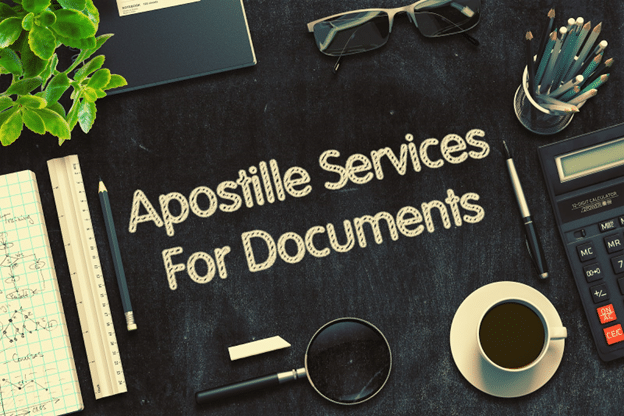Recognizing the Importance of Apostille Qualification and Why It Is Essential for Legal Documents
Among the various mechanisms readily available for this function, apostille certification stands out as a streamlined and universally acknowledged technique. Comprehending the ins and outs and effects of apostille accreditation on legal documents is important for people and organizations engaging in cross-border tasks.
The Definition of Apostille Accreditation
Apostille certification is a specialized kind of authentication that verifies the legitimacy of a legal document for global use. This certification is essential for making certain that records coming from one country are identified as valid in an additional, streamlining the procedure of cross-border transactions, lawful procedures, or individual issues like marital relationship or adoption. The Hague Apostille Convention of 1961 developed the framework for this streamlined certification procedure amongst participating nations.
To obtain an apostille certification, the assigned authority in the record's country of origin have to verify the file's credibility prior to attaching the apostille. Once connected, the apostille makes certain that the file will certainly be accepted as valid in any type of various other nation that is part of the Apostille Convention, without the demand for more certification.
Benefits of Apostille for Legal Files
The usage of apostille certification simplifies the global acknowledgment procedure for legal documents, supplying substantial benefits in promoting cross-border involvements and legal formalities. By affixing an apostille certificate, the record comes to be readily approved in nations that are part of the Hague Apostille Convention, removing the demand for more verification.
Moreover, apostille accreditation boosts the total efficiency of legal procedures by streamlining the procedure of verifying the legitimacy of a paper. On the whole, the benefits of apostille accreditation for lawful records are instrumental in promoting smoother international engagements and making sure conformity with lawful needs throughout borders.
Apostille Vs. Legalisation: Trick Distinctions
When comparing the procedures of apostille qualification and legalisation for legal files, it is necessary to comprehend the vital differences in their corresponding authentication techniques. An apostille is a simplified kind of legalization that is approved amongst countries that become part of the Hague Apostille Convention. The apostille process validates the authenticity of the record and the signature of the providing authority. It does not call for additional consular office or consulate legalisation, making it an extra affordable and straightforward method for confirming files internationally.
On the other hand, legalisation is a more conventional technique that entails multiple actions of verification. It calls for confirmation by numerous authorities, consisting of government divisions and international consular offices or consular offices in both the releasing and obtaining countries. This process can be a lot more pricey visit this web-site and taxing compared to acquiring an apostille. The selection in between apostille certification and legalization depends on the particular demands of the country where the paper will be utilized. Recognizing these distinctions is crucial for guaranteeing the appropriate authentication of legal records for international use.
Countries Approving Apostille Certification

While the Hague Apostille Convention has actually substantially simplified the procedure of cross-border paper authentication, there are still nations that are not party to the convention - Houston TX Apostille. Consequently, papers destined for these countries might need typical legalisation procedures via embassies or consular offices. It is crucial for people and businesses taking care of global purchases to confirm the specific demands of the location nation to ensure compliance with their lawful criteria
Actions to Obtain Apostille for Papers
To obtain an apostille for your papers, you need to begin by determining the suitable providing authority in your country. Once you have recognized the appropriate authority, the next step is to make certain that your paper meets all the requirements for apostille accreditation.
After verifying that your paper satisfies the requirements, you will require to submit an apostille application given by the releasing authority. This type will require information about the paper being validated and the country where it will certainly be utilized. Along with the finished application, you will likely need to submit the original document, a duplicate of your recognition, and any applicable costs.

Final Thought
Finally, apostille certification plays a crucial duty in making sure the authenticity and validity of legal files for international usage (Houston TX Apostille). Understanding the significance of apostille qualification is essential for companies and individuals browsing the complexities of lawful matters and cross-border purchases. By acquiring apostille accreditation, parties can enhance the process of paper verification and authentication, inevitably conserving time and resources in the worldwide sector
To acquire an apostille qualification, the designated authority in the document's nation of origin have to verify the paper's credibility before affixing the apostille. Once connected, the apostille makes certain that the file will certainly be approved as valid in any type of other country that is part of the Apostille Convention, without the requirement for more accreditation.
By affixing an apostille certification, the file becomes conveniently accepted in nations that are component of the Hague Apostille Convention, getting rid of the demand for additional verification.Differentiating in between apostille certification and legalization exposes the differing approval of these authentication methods across different nations, visit homepage with some countries especially identifying and adhering to the apostille process. The apostille certification is commonly approved amongst nations that are component of the Hague Apostille Convention, which presently has 118 participant states.